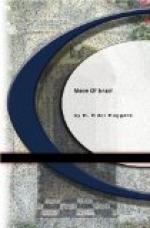How fine a thing, thought I to myself, it is to be a Prince who by lifting a finger can thus command service at any moment of the day or night.
Just at that moment Seti said to me:
“See, Ana, how sad a thing it is to be a Prince, who cannot even stir abroad without notice to his household and commanding the service of a secret guard to spy upon his every action, and doubtless to make report thereof to the police of Pharaoh.”
There are two faces to everything, thought I to myself again.
CHAPTER II
THE BREAKING OF THE CUP
We walked down a broad street bordered by trees, beyond which were lime-washed, flat-roofed houses built of sun-dried brick, standing, each of them, in its own garden, till at length we came to the great market-place just as the full moon rose above the palm-trees, making the world almost as light as day. Tanis, or Rameses as it is also called, was a very fine city then, if only half the size of Memphis, though now that the Court has left it I hear it is much deserted. About this market-place stood great temples of the gods, with pylons and avenues of sphinxes, also that wonder of the world, the colossal statue of the second Rameses, while to the north upon a mound was the glorious palace of Pharaoh. Other palaces there were also, inhabited by the nobles and officers of the Court, and between them ran long streets where dwelt the citizens, ending, some of them, on that branch of the Nile by which the ancient city stood.
Seti halted to gaze at these wondrous buildings.
“They are very old,” he said, “but most of them, like the walls and those temples of Amon and Ptah, have been rebuilt in the time of my grandfather or since his day by the labour of Israelitish slaves who dwell yonder in the rich land of Goshen.”
“They must have cost much gold,” I answered.
“The Kings of Egypt do not pay their slaves,” remarked the Prince shortly.
Then we went on and mingled with the thousands of the people who were wandering to and fro seeking rest after the business of the day. Here on the frontier of Egypt were gathered folk of every race; Bedouins from the desert, Syrians from beyond the Red Sea, merchants from the rich Isle of Chittim, travellers from the coast, and traders from the land of Punt and from the unknown countries of the north. All were talking, laughing and making merry, save some who gathered in circles to listen to a teller of tales or wandering musicians, or to watch women who danced half naked for gifts.




